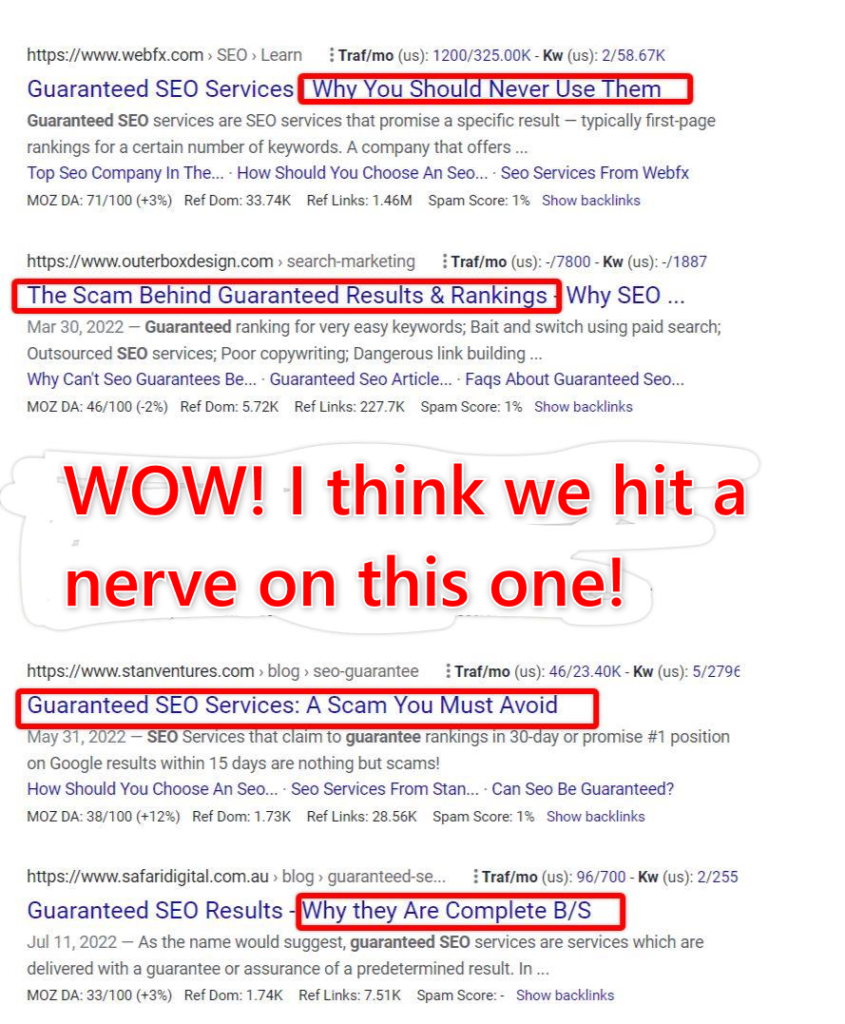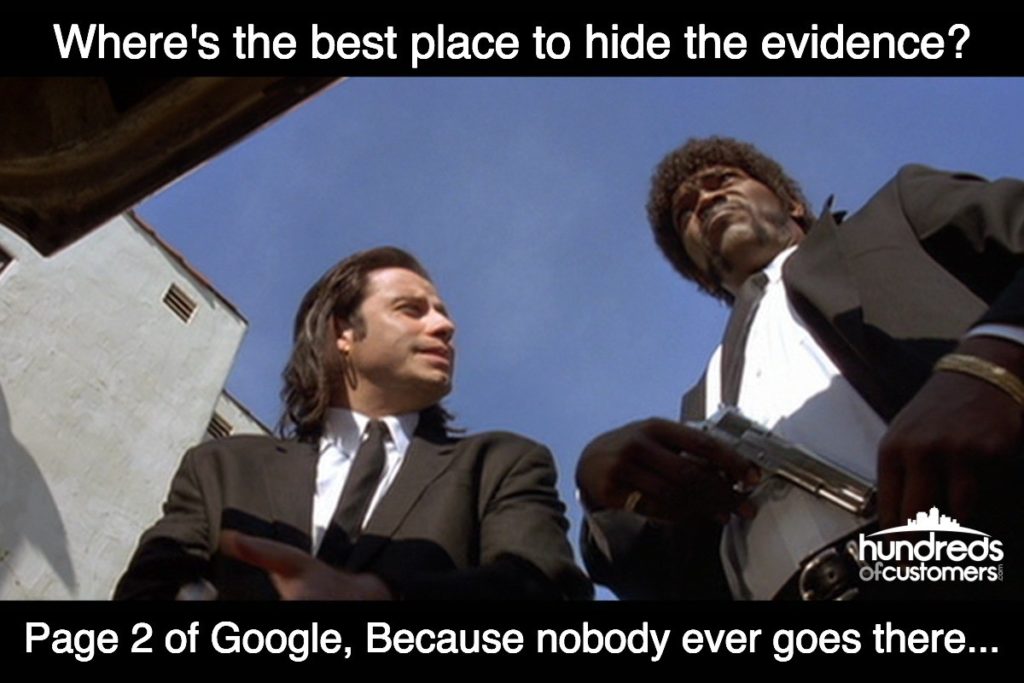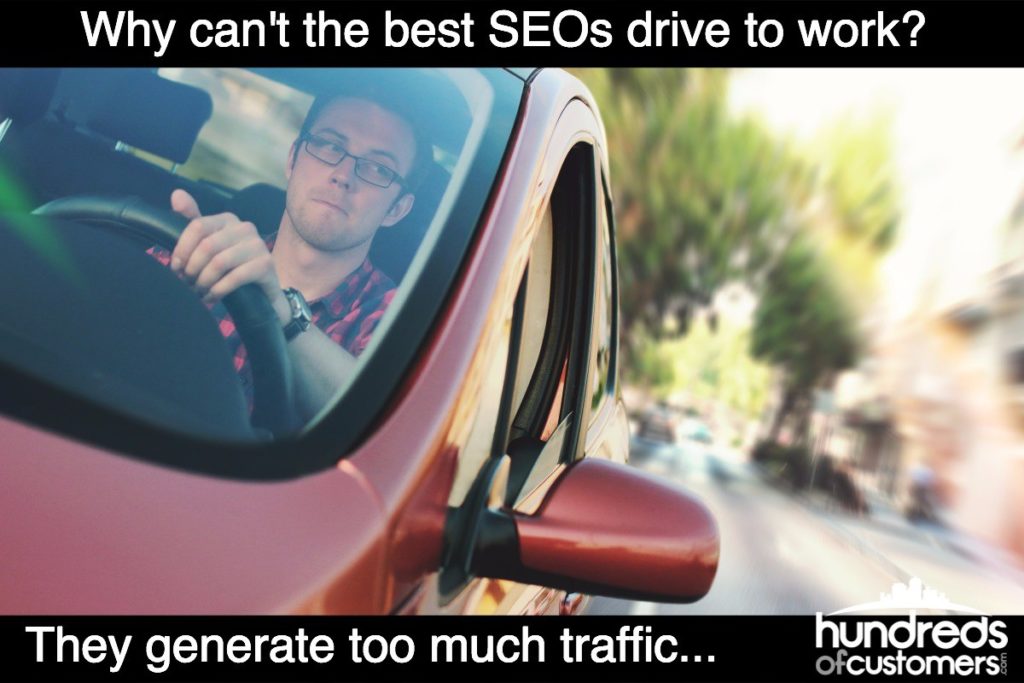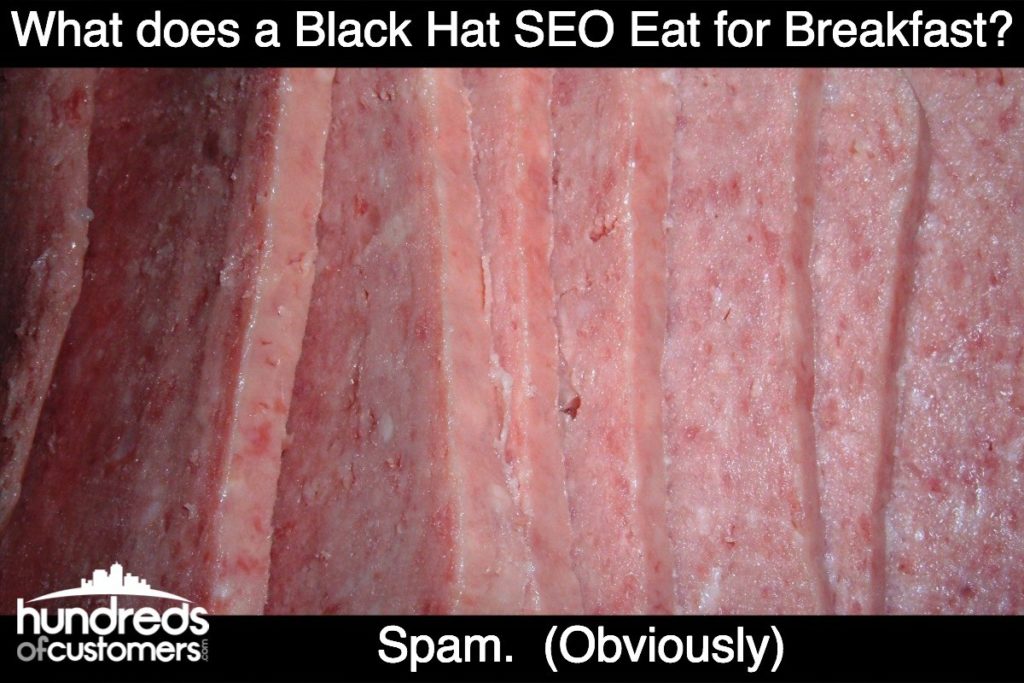TL;DR: most companies are afraid to offer a guaranteed search engine optimization services for attorneys (or for anyone), and this is both a feature and a bug of traditional SEO methods. But I do things radically differently, and that allows me to rank my clients on page one of Google multiple times in under a week. Keep reading and I'll tell you how I learned how to do it and how I can in fact guarantee SEO results. If you've read this piece and you want to learn more, book a time here: https://hundredsofcustomers.com/media (Yes, I guarantee results, and I won't work with you if I don't think I can get them for you, so you have nothing to lose by grabbing a time on my calendar. To learn how I can make such an outlandish promise…well…read on!)
This will hopefully make for an interesting story. I have been in the digital marketing space actively, running this company, for a little over a decade now. Like many people when I started I failed my way forward, not having a clear idea of what I was doing. I actually began by doing arbitrage, namely selling other people's services and "white labeling" them as my own. I'm not particularly proud of that oh, but I also don't regret doing it. At the end of the day Arbitrage is how almost every business works. It's the mechanism that makes Walmart and Amazon run.
Over time, I joined the number of masterminds and various training courses and groups so that I could better learn and hone my skills in search engine optimization. One of the things I noticed is a lot of people would make bold promises and bold claims about search engine optimization and how easy it was to rank. Almost without a doubt every single time they made promises they either could not deliver, or they could deliver exceptionally well because they had discovered a loophole that they could exploit in a way that would launch people to page one quickly, but too quickly. Google would invariably catch on, and they would change the algorithm. When they did this, not only would those companies that suddenly rocketed to the top lose their rankings, but in some cases egregious violations got them "dis-indexed" entirely (i.e., completely removed from showing up in the search results as a punishment). This of course was a frightening prospect for anyone because for many businesses being found in Google was the lifeblood of their company, and to suddenly Disappear Completely would be catastrophic.
Thus, many people learned that they should fear any form of guaranteed SEO service, and so when you Google "Guaranteed search engine optimization services" or some permutation thereof, you find listing after listing in the search results that reads like this:
permutation thereof, you find listing after listing in the search results that reads like this:

Those are no uncertain terms...😏
So what gives? Is a guarantee behind search engine optimization really a red flag? Or are these companies merely under performers who are trying to creatively leverage the fact that they are unable to guarantee what they purport to deliver into a feature and not a bug? I don't want to be overly harsh with these individuals because to be quite honest traditional SEO is very difficult and it gets harder every algorithm update (last time I checked Google updates their algorithm, and basically every day).
Search engine rankings pages (SERPs) are the new Yellow Pages. Gone are the days of Simply buying the biggest ad in the legal section, or trying to get on the front cover as a featured lawyer. I find it funny to look at the Yellow Pages today because they've shrunk noticeably over the last decade, assuming you even have one, and if you look at the prime real estate for advertisements which is the front and back covers of the thing, you will find nearly all the advertisements are aimed towards an audience that is progressively graying and geriatric. This appropriately signifies who the primary demographic that still relies on the Yellow Pages is (I'm looking at you, Boomers).
This is not a bad thing for a variety of reasons, not the least of which of course as an SEO company the thing that pays my bills is people who need something to achieve their business goals of growth and prestige, and the business owners have learned that the Yellow Pages simply is not the venue for that anymore.
The death of the Yellow Pages led to the rise of search engine optimization companies, and SEO agencies and SEO strategies proliferated for a long time. Potential customers are looking for specific keyword rankings in the major search engines, principally Google, which I am told gets over 92% of the searchvolume,e which means it clearly is the dominating 800-pound gorilla in the room. SEO rankings in Google, weather in the organic listings or their Maps packs for local businesses can literally be a make-or-break issue for a lot of businesses.
On top of that, at least 90% of searches never leave page 1, and purportedly 25% of all searches just hit the first Google entry, almost unthinkingly.

Remember also that there's usually only around 10 listings on a page, and actually in recent results I've been seeing a trend towards 9 which is, if my math is correct, one fewer.
To understand why search works the way that it does its best to step back for a minute and think about Google from a Google perspective. I'm told Google makes over $300M dollars a day, and they do that almost exclusively through showing ads to people. These ads have changed their shape and size and location over the years, but they still exist and are still very profitable precisely because, like the Yellow Pages before it, when you advertise with Google you are getting in front of people that are actively searching for a solution and presenting yourself or your business or your company as that solution. People are willing to pay to get in front of that traffic and so Google has a vested interest in making sure that that traffic continues.
Think of a billboard used to advertise two people on a highway. I live in Kansas and my wife is from Pennsylvania and we regularly drive back and forth throughout the year a couple of times. There's lots, and lots of billboards that we pass on that highway. But sometimes we will take a lesser-known highway and suddenly there are fewer Billboards and they're usually smaller, sometimes they're not even lit up at night. Why?

Traffic. Big companies will pay big bucks to get their message in front of large numbers of people. They will not pay the same amount of money for a billboard on interstate I-70 that sees millions of people drive on it every week, as they would a sign on Rural Road 47 that sees if you hundred people drive on it every month. Google understands this phenomenon and so they have a vested interest in making sure that people continue to want to use their search engine over and above all other competitive engines.
So Google has a vested interest in making sure that their search engine returns the best results oh, and this interest is directly at odds with many SEO service providers who seek to exploit various loopholes to get their clients on the page one.
So the lifeblood of many companies is simply being found on page one, ideally near the top of the search engine results page. Because of this people have tried many tricks and ranking exploits to secure one of those coveted spots.
Sometimes the trick is as simple as repeating the series of words you want to be found for at the bottom of the page and making sure that those words are colored the same as the background so that Google when it crawls your site and sees those words and believes your page is containing relevant information, judged by the keyword density on the page, but the early iterations of their algorithm simply couldn't tell that this was just Spam. Thus the Wikipedia page that talks about spam and a page that literally just repeats the word spam 1000 times would have been tough competitors at one point.

This is appropriately called "keyword stuffing" because you're simply stuffing keywords you want to be found for on the page you want to be found.

Other spammy techniques included anchor text bombs we're by hundreds of people if not thousands of people would all linked to a page with the same anchor text and when Google crawled all of these links it is assumed that the anchor text was a relevant explanation of the page and so the page would rank high. This led to some rather hilarious results, the most famous of which is the "miserable failure" debacle, wherein a search of that particular phrase led to the official White House page of then president George W. Bush.
This worked in part because one of the major metrics Google looked at and still does is what links are going to a site, but they definitely have, over time, devalued the amount of authority most links have, although some links are still very important. What Google wants to see now is fewer spammy links (such as reciprocal links where one page links to another, in exchange for that page linking back to the first page)

But we will come back to this idea shortly because this is how we generate guaranteed SEO...
(In the heyday of Link building I would run an SEO audit of, say, attorneys or chiropractors in a local area. The software I would run would do a quick search to see how many backlinks each website had. It would often read something like this:
Dr. Bob Smith 124 Backlinks
Dr. Steve Jones 345 Backlinks
Dr. Mike Jones 1,230 Backlinks
Dr. Kevin Smith 3,203,440,201 Backlinks
...which made it pretty obvious that one of these things was probably not legit... and Google's RankBrain could see patterns like that in an instant.)
And thus SEO campaign after SEO campaign was built around the concept of finding loopholes and exploits in the algorithm, powered by Google slapping back and beating down all of those who exploited the loophole in a string of often animal themed updates, like Penguin, Hummingbird, and my fav: Panda.
With each update the algorithm got smarter and outdated SEO techniques fell by the wayside as SEO firms now had to rely on relevant content and follow the search engine guidelines in order to Lee and their clients in the organic search engine results pages for various search queries. Gone are the short-term strategies and fly-by-night loopholes, and now search engine optimization strategy comes down to a custom strategy - as opposed to a one-size-fits-all strategy - which is significantly harder to do.
A long-term strategy for search engine optimization involves a significant investment of time and the use of ethical SEO tactics as opposed to black hat tactics, such as the various black hat techniques outlined above.
For local businesses, positive reviews play a powerful role in convincing the ranking algorithm that you are worth showing to be searchers. And even this has been exploited with people creating fake accounts and building out fake reviews, Google has definitely wised up to this too. (If you are not collecting reviews from your customers and clients, you should definitely start yesterday.) High quality backlinks are important, but so are business citations in relevant directories.
One of the ways Google seems to prevent websites that could be spamming from making their way into the search results is by putting newer sites in what I would call a sandbox - more or less keeping it isolated until Google can ascertain whether the site is of a high enough quality to warrant being indexed, and where it should fall within those search results.
This was a problem that I ran into a few years into my search engine optimization career. I had a couple of clients whose websites I simply could not get Google to show in any meaningful capacity. So I went to the drawing board and tried to figure out what was going on. I knew that Google loved Brands because Brands take time to build. They are vetted, they are trusted. In fact all that OFF-Page SEO really is, is trying to "fake it until you make it," as they say... You're trying to look like a known and trusted and liked brand, and you do that often times through backlinking as we discussed above. Backlinks make a website seem trusted and known and vetted, but as more and more people abused this metric, Google more and more tweaked the ways that it weighted backlinks.
As I was thinking about Brands I realized that one thing all major brands have in common is that they are always getting into the news. If you were to look on any particular day you would be almost guaranteed to see stories in the news about Coca-Cola, Nike, AT&T, etc. So I wondered, what if I got some news stories about my client published.
And that's exactly what I did...
What happened next both fulfilled my expectations and blew them out of the water because my expectation was that these links would get the website indexed and probably move it up in the search results, which is in fact what happened. But I didn't even realize initially that what I had accidentally stumbled across was a method of putting them on page one overnight because those new stories, written on already known and liked and trusted internet properties, immediately shot to page one.
So, I tried it again, and surprisingly I got similar results. Over time the network grew and my ability to track what was and was not ranking also grew, and we started to see that on average are clients we're hitting page 1 hundreds of times in a single campaign for variations on the various keywords that we were trying to rank for, which was very cool.
And like a fine wine our ability to do this has only gotten better over time because we started to really understand what sorts of things do and do not rank, and which aspects of what we publish are most important to seeing lasting and meaningful and numerous rankings in the search engines.
And that, more or less, is how I came to be able to offer a guaranteed search engine optimization. I can put my clients on page one of Google usually in about 2 weeks and these rankings sometimes stick indefinitely. If you want to jump on a call and see if this strategy would be a good fit for your firm or business, I will show you specific examples, but I don't share those publicly of course, including rankings that have been there for 4 - 5 years.
